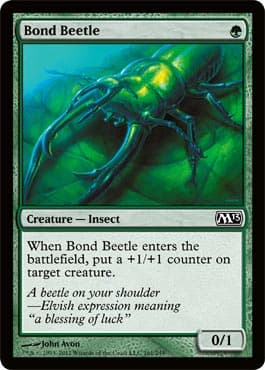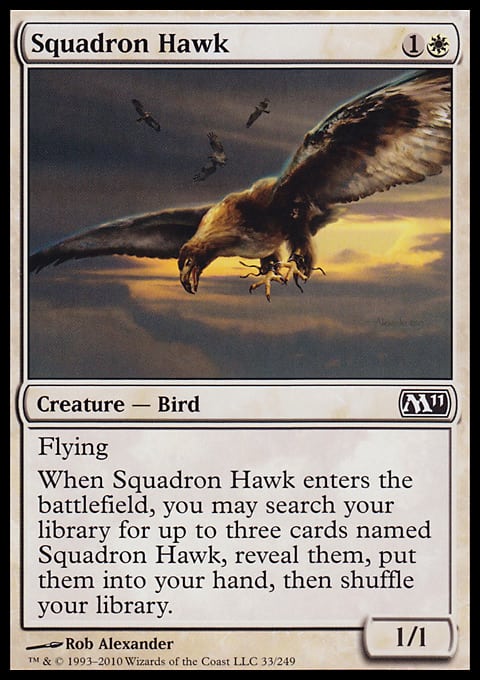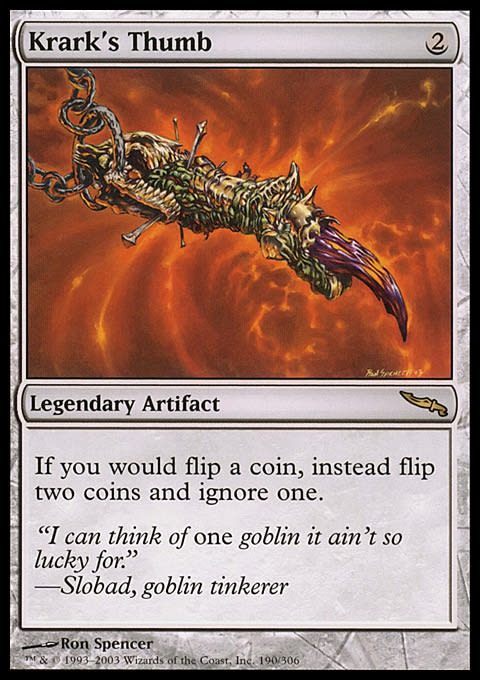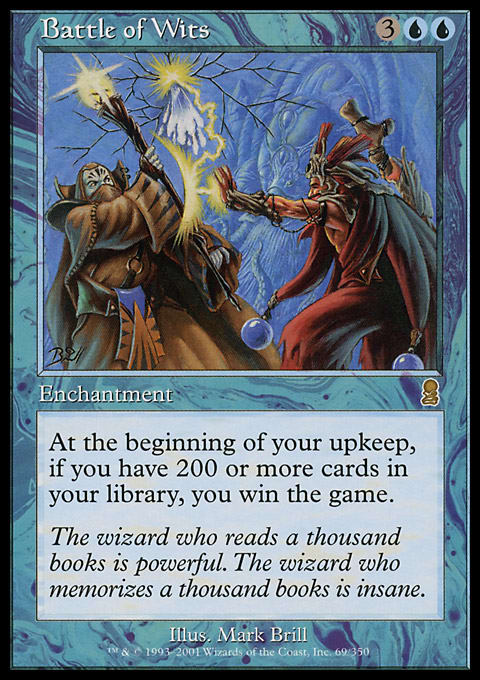It probably doesn’t surprise you to hear that I used to daydream a lot as a kid. It probably won’t surprise you either to hear that I still daydream quite a bit, mostly about adulation that I haven’t yet earned. Which is what attracted me the most to 52 Decks in 52 Weeks, as it was then called—I figured something so new and so original was sure to be a hit. Throw in my patented not-really-about-Magic Magic musings, and I was at a loss of words for how to explain why the unwashed masses wouldn’t just be TOTALLY BLOWN AWAY.
To my great shock, it didn’t all go quite like that.
You could say that my estimation of my own skills was a bit off. I started back into Magic writing in fall ’10 after a totally unintentional two-year Magic hiatus that was mercifully ended by my rediscovery of the game when I was invited to my friend Brad’s place for the week leading into Grand Prix: DC.
If you have the chance to stay somewhere with, like, six or seven friends for a week leading into a big event like a Grand Prix or Pro Tour, I highly suggest putting real life on hold for a week and pulling the trigger on that—nothing’s better than neglecting your responsibilities in lieu of pursuing mastery of a children’s card game for a week with a bunch of your friends and a shitload of beer. I am not being sarcastic.
Ever the opportunist, Ted Knutson must’ve known I was getting back into the game because the fall following GP: DC, he started the StarCityGames search for writers, and it’s safe to say that none of you would be subjected to my tangential babblings if not for Ted Knutson (hate mail goes to TheodoreCardGame at gmail dot uk).
Fast forward about six months. I wrote this, which got the attention of this and landed me a writing gig here. Shortly after that—I’m thinking late June—I was in a Google hangout (why they chose not to call them G-Spots is beyond me) that featured ex-editor Debbie Freeland and ex-content manager Trick Jarrett among others. It was pretty fun. Debbie’s baby cried a lot while I drank a lot of beers and saw a mouse in my kitchen. Over the din of all that, Trick talked a lot about ideas for columns, and one struck me: Play a different deck every week in FNM for a year. It would be called 52 Decks in 52 Weeks. In an incredibly shortsighted move that would totally alter the course of my life for a year, I jumped on it without really realizing what it meant.
No, the only thing I could conceive at that point was how much unadulterated praise I’d receive over the passing weeks, as I delved deeper into the question that is, “What Is Friday Night Magic?” while still maintaining all the accessibility I loved so much about my favorite Magic writers.
52 articles later, and . . . yeah.
A very, very large part of me worries that what I’m writing about isn’t actually accessible to anyone—that Magic is different everywhere. Friday Night Magic just feels so specific; it’s impossible to talk about FNM without discussing the regular cast of characters who are there when you walk in the door. To date, there are only two writers in the history of Magic: The Gathering writing whose friends I’d actually want to hear them talk about, and those two writers are Jeff
Cunningham and Jamie Wakefield. Everyone else’s friends sound like the same bland pastiche of whatever the writer thinks is cool (let’s face it: If you play Magic, your idea of what’s “cool” is most likely very warped), so I’ve been hesitant to go into too much detail about the regulars. But they’re really what make an FNM what it is. A local game store can only do so much. The people there direct the topics of conversation and dictate the direction of all the other regulars. To be very plain, I was lucky enough to find an LGS where its players support each other and try to prop each other up. The alternative of an environment like this is that of a shark tank—novice players are ruthlessly beaten by the more experienced, and from there, they either pick up on the plays that are beating them (they are given no help) or they decide that this game isn’t worth it and quit altogether.
I should probably say at this point that I relate to the latter group of players much more than I’d like. It’s how I learned the game, after all, so it’s been strange to see a community full of people whose default is to help each other out so much. What’s really remarkable about a community like this is that it naturally allows players to become very good very quickly. It’s not something I’ve ever witnessed, but over the course of a year, the players I used to slice through effortlessly are now making plays and forcing me to play extremely tight.
Taken from Pat Chapin’s recent premium article on SCG, Just Not That Into Grixis:
Maybe the next time you see them making a play you think is atrocious, ask them why they are doing that. Often, they are just repeating from memory some pattern they know. Questioning the action is far more effective than just telling them "the right play." Besides, once in a while, they will know something you do not.
Shamefully, I have to admit that my instincts still aren’t to try to help someone’s game with direct lines of communication, but by thrashing that person over and over again until he gets it. Only after writing this column could I ever be able to understand how wrong that mentality is, although it’s worth noting that I didn’t come to that conclusion by having it rationally explained to me, but by having it thrust in my face over and over.
Magic players, as well as human beings in general, like to labor under the idea that some people just have inherent skill at things. Embarrassingly enough, I used to think that I was one of those people insofar as Magic’s concerned; I used to figure that since I’d been playing the game longer, I’d be able to breeze past the guys who just grind the same decks over and over. I believed their successes totally hinged on the fact that they relied on one deck, and that if they were presented with something else, they’d straight-out suck. They might be better at playing a particular deck, but I’m better at Magic.
Or so I thought. My results—six wins in 52 weeks—firmly slam that contention in a garbage can and set it ablaze.
I didn’t just learn that everything is earned; I had it bashed into my skull with a sledgehammer. No one’s skill is just inherent. No one can just pick up a deck completely cold and play it well without putting in the work, and when someone tells you he did exactly that, what he’s leaving out is his personal Mount Everest of punts, misclicks, incorrect reads, outlandish bluffs, and lessons learned in order to make it to where he’s at.
What I’m ultimately getting at is that FNM isn’t just a place to become better at playing Magic, it’s a place to become better at being a part of a community and—one can hope—to find like-minded people who want to improve their games and keep playing for higher and higher stakes. I’m not sure what else to say other than that I was really lucky to find that at Cloud City, and it’s touching to know they accept me, too, flaws and all.
A while ago, Patrick Chapin posed a question on Twitter: Would you write a novel in which the main character is lucky or skilled at life? I think that was the question; I’m paraphrasing. I do remember my response word for word, though.
I would write about someone who uses skill to maximize his or her good fortune.
It sucks that I have to tell you that I basically lucked into a Magic scene that works positively for me, but I strongly feel that life is about maximizing the chances you have, even if my decisions aren’t always necessarily supported by that philosophy. If you’re new to an area and have that familiar sinking feeling when looking around you, look harder. There’s bound to be someone with similar Magic (and if you’re really lucky, life) goals as you have. It’s not hard to strike up a friendship from there. You just have to be willing to seek that person out.
I played Battle of Wits last week.
"Standard Battle of Wits"
- Creatures (39)
- 1 Massacre Wurm
- 1 Treasure Mage
- 2 Consecrated Sphinx
- 2 Dungeon Geists
- 2 Frost Titan
- 2 Rune-Scarred Demon
- 2 Sun Titan
- 2 Trinket Mage
- 3 Phantasmal Image
- 4 Augur of Bolas
- 4 Fog Bank
- 4 Snapcaster Mage
- 4 Vampire Nighthawk
- 1 Spellskite
- 1 Wurmcoil Engine
- 4 Solemn Simulacrum
- Planeswalkers (4)
- 1 Gideon Jura
- 1 Karn Liberated
- 2 Tamiyo, the Moon Sage
- Spells (111)
- 3 Mana Leak
- 4 Dismember
- 4 Doom Blade
- 4 Forbidden Alchemy
- 4 Go for the Throat
- 4 Think Twice
- 4 Tragic Slip
- 4 Tribute to Hunger
- 1 Sever the Bloodline
- 2 Devastation Tide
- 2 Entreat the Angels
- 3 Barter in Blood
- 3 Diabolic Revelation
- 4 Amass the Components
- 4 Black Sun's Zenith
- 4 Day of Judgment
- 4 Diabolic Tutor
- 4 Increasing Ambition
- 4 Lingering Souls
- 4 Ponder
- 4 Temporal Mastery
- 4 Terminus
- 4 Timely Reinforcements
- 4 Battle of Wits
- 1 Batterskull
- 1 Mimic Vat
- 2 Elixir of Immortality
- 2 Vessel of Endless Rest
- 3 Traveler's Amulet
- 4 Mycosynth Wellspring
- 4 Nihil Spellbomb
- 4 Pristine Talisman
- 4 Sphere of the Suns
- Lands (90)
- 21 Island
- 21 Plains
- 23 Swamp
- 1 Vault of the Archangel
- 4 Darkslick Shores
- 4 Drowned Catacomb
- 4 Evolving Wilds
- 4 Glacial Fortress
- 4 Isolated Chapel
- 4 Seachrome Coast
That decklist was murder to type out, and I’d rather fellate a wolverine than do that again.
This is not my list, but the list of my friend Ryan Miller—again, not the Buffalo Sabres goalie, just a normal dude who makes a mean burrito. Most of the choices in the main deck come down to simple card availability; Ryan only owns two Vessel of Endless Rest, for example. I wasn’t about to complain; it’s not every day you’re handed a Battle of Wits deck specifically for the purpose of wrapping up your exhaustive yearlong weekly column. I just went with the flow on this one.
Like a lot of the decks I’ve been playing lately that have been just bad (sorry, Ryan!), I feel that it’s pretty pointless to go over the matches. I went 2–3, making some pretty spectacular punts along the way; some were organic, some were “for the lols,” as the kids put it, and some were a mixture of both. For example, in Round 2, I’m playing against my friend Corry, who’s playing some sort of base-green aggro deck. He has a lot of dudes in play as I resolve a Diabolic Revelation searching up two cards. On my next turn, I cast Battle of Wits and say “go,” allowing him to cast Wolfir Silverheart and hit me for exactsies.
There was a crowd of people around who basically watched me play my removal in the total wrong order the entire game and get bailed out by my deck having the perfect draw, and no one hesitated to remind me of this after the match. To his credit, Corry had expected to be dead to a Doom Blade:
“What was the other card you searched up? Don’t tell me it was . . . ”
I grinned and showed him the second Battle of Wits, and the crowd laughed quite a bit. Totally worth it.
You see, the first time you slam a two-hundred-fortyish-card deck on the table, it shakes everything and makes a big sound. Your opponent may even laugh a little. When he cuts, it’s more of a dexterity test than anything else. In short, you are playing the part of the showman, and the showman’s job is to make sure everyone’s having a good time. I am of the belief that I, however unknowingly, played my part well.
It just felt really nice to relax. I felt nice knowing that I didn’t have to play any Magic next week at all, if I so chose.
I mentioned this last week, but an inordinate number of people have asked me what I’m going to do when this is all said and done. I’m going to try to delve into that now.
The most interesting things about Magic to me by far are the personality traits of the people it attracts and the behavioral patterns of different types of players. Magic is a fun game, one that I enjoy on many different platforms, but when I go to a physical tournament and I see all the different psychological profiles forced to try to best each other, what they do to try to make it there, and how normally sedentary people adapt to a kill-or-be-killed environment, that’s really fascinating for me. I obviously like winning, too, but at this point, I’m much better at people-watching than winning. I firmly believe that my articles have always reflected this, whether they’ve been about FNM or the fictional diary of a Caw-Blade player. They will continue to do this, even if, God forbid, I start winning some matches.
I will see you all next week. You’ve all been so awesome. I try not to get into my comments sections too much because I want conversations to grow organically, but know that I’m reading and that all of your support has been fucking tremendous. You kick ass.
Jon Corpora
Pronounced Ca-pora

























